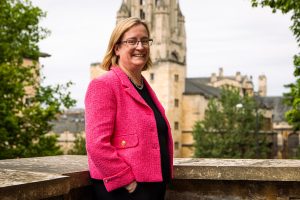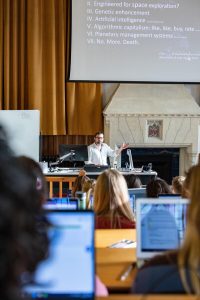Swap disposable plastic bottles/coffee cups for re-usable
 Café Nero, Costa, and Starbucks all have offers when you get your coffee in a re-usable cup, so instead of adding to the 2.5 billion disposable coffee cups that are thrown away each year (estimated by Costa), save money by taking your own!
Café Nero, Costa, and Starbucks all have offers when you get your coffee in a re-usable cup, so instead of adding to the 2.5 billion disposable coffee cups that are thrown away each year (estimated by Costa), save money by taking your own!
Save yourself that £1.50 for a plastic bottle of water, and invest in a steel water bottle. It keeps your water cool throughout the day, and you can fill up at home, in your local coffee shop, or at one of the University’s water fountains around campus, for free! Find your nearest campus water fountain here.
Take your own bags to the shops
Did you know that bags for life use up to three times more plastic than single use carrier bags? They’re also sturdier, making them much more detrimental when getting into natural environments. Make sure you’re getting the most of your bags for life, remember to take them to the shops with you and avoid buying more than you need. Or, take your backpack with you to shop, or any other bags that you use in your day to day life to avoid the plastic option completely!
 Say no to plastic cutlery when you order in
Say no to plastic cutlery when you order in
Plastic straws, forks spoons, are included in many fast food options, and many can’t be recycled. However, most places on Deliveroo or UberEats let you choose whether or not they include plastic cutlery. Whenever you’re able, make sure you’re saying no to these single-use plastic items.
Cling film can’t be recycled, but tinfoil can!
Clingfilm is made from polyvinylidene chloride (PVC) and does not degrade. Manufacturing PVC releases dioxins that is toxic to humans. Swap out cling film for tinfoil, which (once clean) can be recycled! Even better, use reusable lunch boxes or beeswax wraps. Either way, make sure you’re avoiding clingfilm wherever you can.
Ditch the glitter

Glitter is made from aluminium or plastic coated in paint or metal and it’s everywhere. You can find glitter in body lotions, bath bombs, eyeshadows, and generally all over the beauty industry. Glitter is made of microplastics and microplastics never dissipate. It wreaks havoc on biodiversity and marine life.
Did you know there’s no limit on how long it takes a product to break down when it’s labelled ‘biodegradable’? Or that some biodegradable material require specialist treatment in order to do so? That means even when products like glitter are labelled such, it doesn’t guarantee that the product is eco-friendly. By the time some biodegradable plastics have broken down, they’ve already caused harm to the environment.
Some eco-friendly glitter alternatives are coloured sand, salt, coloured rice, certain face paints, sugar, and crushed glass. Of course not all of these can be used cosmetically, but options like glass can work great for craft projects.
Controlling waste at the University
Did you know that less than 5% of the University’s overall waste ends up in landfill? This is because the University is committed to maximising reuse, recycling as much as possible, and reducing the amount of waste produced.
See more on the University’s sustainability efforts here.




 The benefits of a new network will be felt by all 30,000+ members of our community. Anyone who joins the local network on, or away from, campus will experience a seamless, secure, sustainable, and fully supported digital environment.
The benefits of a new network will be felt by all 30,000+ members of our community. Anyone who joins the local network on, or away from, campus will experience a seamless, secure, sustainable, and fully supported digital environment.